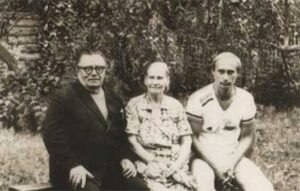Year: 2014
-

On Originality
Qedipus at ColonnusSome say originality in fiction is no longer possible. When did this happen? When did we exhaust the creative potential of humanity to tell new stories? Did originality begin and end with the ancients, and has everything …
-

A metaphysical interview with Toronto city councillor Doug Ford
This afternoon I had the opportunity for a metaphysical interview with Doug Ford, Toronto city councillor and brother to the mayor, Rob Ford. You’ve probably heard of Rob Ford: his pro-taxpayer, anti-downtown-fatcat policies have been featured in news media all over the world, and Youtube is full of amateur videos of his impromptu political speeches.…
-

Return to Ukraine
I’d hoped to make it back to Ukraine for another metaphysical interview for a while now, but with my work schedule it just hasn’t been possible. It takes time, you know, speculating about a transatlantic flight. Finally, while doing laundry this afternoon I managed to get back to Kramatorsk, in the self-declared sovereign state that…
-
“Thinging” vs. Humanising
While I was working on my second book a couple of days ago, I was reminded of a phenomenon that seems to be becoming more and more prevalent these days. I’m talking about the habit of treating people as things rather than as human beings. You see this especially on the news, where people are lumped…
-

An Introduction.
This is my first blog post and it may also be my last. I am plagued with the question, “Why blog?” It seems to me a self-indulgent and also somewhat pointless endeavor. Do I really need to add my voice to the millions already shouting …
-

Stephen Harper, Grade Eight
Beverley McLachlin cleared her throat. She’d been teaching junior high for thirty years, long enough that she’d started thinking of things in self-coined aphorisms. There are all sorts of troublemakers, went one of them, but the smart ones are the worst. That definitely applied here. “Stephen,” she said sharply, and tapped her foot until he…
-

A metaphysical interview with some protesters in eastern Ukraine
Last night I had the opportunity for a metaphysical interview with a group of protesters in eastern Ukraine. (As I explained in a previous post, a metaphysical interview is one where instead of talking to a person you speculate about what they might say.) While the kids were watching Johnny Test I nipped over to…
-

A metaphysical interview with Vladimir Putin’s mom
In recent weeks Vladimir Putin has invented a new sort of Russian reversal. This is where you send troops to Crimea and take control of the government and media, then hold a vote on whether you should send in troops and take control of a region’s government and media. The notion of consent involved here…
-

“I don’t think every sweater you get from Goodwill has demons in it”
No posts recently; I was busy writing for a while. Then I got sick with bronchitis for nearly two weeks. Then I didn’t have anything interesting to say.I still don’t, but somehow this morning I ended up reading the Christian Post for a while….
-

More Friday morning lightbulb jokes
How many philosophers does it take to screw in a lightbulb?Six to contemplate whether the lightbulb is real,four to try to simplify the problem by giving a definition of “lightbulb”, one to argue that whether the bulb is burnt out is a merely contingen…